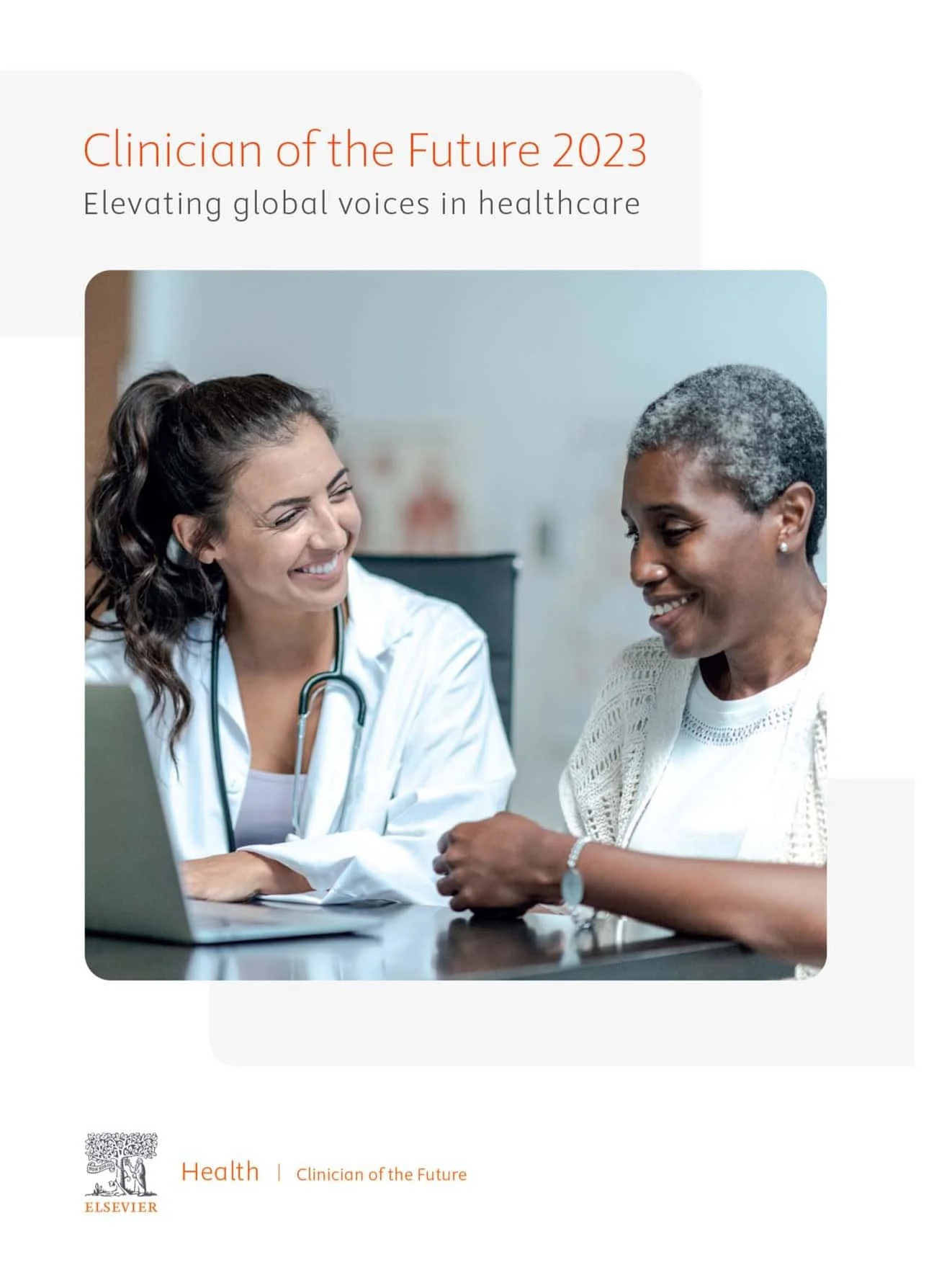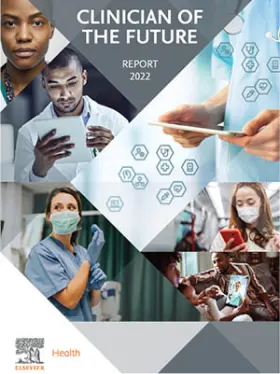Clinician of the Future: a 2022 report
March 15, 2022

Elsevier Health's global report reveals clinicians' pain points, predictions for the future and how the industry can come together to address gaps.

The new Clinician of the Future 2023: Education Edition is here
Download the full report (opens in new tab/window)
Clinician of the Future 2023 report
See what they're saying (opens in new tab/window)Healthcare is connected to every aspect of society. We rely on highly trained clinicians to keep us healthy using their extensive knowledge and progressively more advanced clinical tools and resources.
But clinicians the world over are facing many challenges. Caring for a growing (and aging) population, keeping up to date with the latest medical information and health technology, and responding the needs of more empowered patients have all increased pressure on healthcare professionals. The Covid-19 pandemic has placed further strain on doctors and nurses caring for patients in the most trying of circumstances.
With these evolving challenges set to grow in the years ahead, how do we help prepare clinicians for the next decade? What skills will the clinician of the future require to provide the best care for their patients? How will care be provided? And how will technological developments impact medical training and daily practice?
Elsevier Health colleagues have developed the Clinician of the Future report(opens in new tab/window) to explore global trends and changes that will impact the future of healthcare. We engaged with nearly 3,000 clinicians from 111 countries to ask what healthcare will look like in 10 years’ time — and how we can address the challenges to come.
We want to understand the drivers of change and what the next decade holds for clinicians. This will ensure we can all be ready to support them.
We invite you to explore the key findings and recommendations on this page and in the full report.
Scroll down to read about:
Addressing clinician burnout
The impact of digital health and technology
The the evolving skills set for doctors and nurses
A focus on prevention
Report methodology
Elsevier's call to action

Clinician of the Future: a 2022 report
Download the full report (opens in new tab/window)Key theme: Addressing clinician burnout
“Patients and their families are increasingly demanding. This puts considerable pressure on nurses.” — Clinician, France
Clinicians are concerned about a global shortage of doctors and nurses and many have indicated they will leave the profession or change roles as a result of burnout. Many are feeling overwhelmed with the increasing amount of information, data and technology they must keep up with, in addition to a growing population of empowered patients adding pressure to already overworked healthcare professionals. To reverse this trend, clinicians are calling for more well-being support over the next 10 years, as well as setting aside time to provide training and support in new technologies that will help clinicians work more efficiently, and preventing technology being viewed as a burden.

During discovery interviews for the Clinician of the Future study, key themes emerged as challenges.
What will this mean for the Future Balanced Clinician?
“More is expected of us, with an increasing workload and constant training to keep up to date and move forward. This has an impact on work/life balance and morale amongst some colleagues is low.” — Clinician, UK
Today’s clinicians feel overstretched. And they expect the pressures of the job to increase in the next 10 years – the growing global population, high patient expectations, the perceived burden of digital health technologies and increase in data all contribute to clinicians predicting there will be a bigger shortfall of nurses and doctors in 2031. Increasing the focus on clinician well-being is identified as a leading priority by clinicians and will be crucial to overcoming burnout and workforce shortages.
26% of clinicians globally say well-being support is a priority.
74% say there will be a shortage of nurses, 88% say there will be a shortage of doctors
While 85% of clinicians said they enjoyed their jobs, only 57% felt they had a good work-life balance.
Key theme: the impact of digital health and technology
Clinicians predict that technological literacy will be the most important capability for doctors and nurses in 10 years’ time. However, many report being overwhelmed by the sheer amount of data and information they are expected to take on, leading to concerns that increasing the role of health technology will take up more of their time rather than saving it. There is widespread support amongst clinicians to overhaul education and training to ensure they can keep pace with the rapid rate of technological advances.
56% of clinicians globally predict they will base most of their clinical decisions using tools that utilize artificial intelligence
69% report being overwhelmed with the current volume of data
69% predict the widespread use of digital health technologies to become an even more challenging burden in the future
83% believe training needs to be overhauled so they can keep pace with technological advancements
What will this mean for the Future Tech-Savvy Clinician?
“There’s no time spent separately to learn technology. That education needs to be instilled into the system to ensure all doctors are educated.” — Clinician, US
“Clinicians need to believe that this change isn’t being done ‘to them’ — instead they need to be active participants who want to utilize digital technologies.” — Clinician, UK
There has been rapid growth in the use of technology in healthcare, and clinicians expect that trend to continue over the next decade. However, while technology provides huge potential to improve the quality of care, clinicians warn that technology could become a challenging burden over the next 10 years. Clinicians were clear that clinical processes and medical education will have to keep pace with technological advancement; clinicians identify education and training on the latest technical developments as a key priority for the next 10 years. Special attention will also be required to ensure all patient populations benefit from technology, and prevent its use increasing existing health inequalities.
70% of clinicians globally agree the widespread use of digital health technologies will enable the positive transformation of healthcare
69% agreed digital health technologies will be a challenging burden
64% agreed the impact of health inequalities will be exacerbated.
63% expect most consultations to be remote in 10 years, so medical training will need to reflect how to build a clinician-patient relationship via telemedicine and virtual appointments.
What will this mean for the Future Accessible Clinician?
Inequity of healthcare access is a leading concern among today’s clinicians. They cite an increase in both non-communicable and infectious diseases, a global shortage of clinicians, and a focus on cost rather than care in delivering healthcare an as contributory factors. Clinicians expect to play their part in reducing inequities over the next 10 years. Providing care in patients’ homes and via telehealth will make clinicians more accessible, and spending more time managing public health and preventing ill health will help improve health outcomes in low-income populations.
68% of respondents globally agreed there is too much focus on cost rather than care.
49% agreed the majority of healthcare will be provided in a patient’s home in 10 years’ time.
73% identified that in 10 years’ time, managing public health will be a key priority within the clinician’s role.

Key theme: The evolving skills set for doctors and nurses
“You've got to be a communicator. You've got to have empathy. You've got to speak to people. And of course, the biggest challenge now is this has to be done 2 dimensionally.” — Senior Clinician, US
Clinicians expect more patient consultations to be conducted remotely in the future. While making healthcare more accessible, clinicians expressed concern that it would be harder to express empathy and utilize the necessary soft skills required when communicating with patients via a screen. Clinicians are clear that guidance is required to set out when consultations should be conducted in person and when they could be done virtually. More support is needed to help the clinician of the future maintain a positive relationship with patients in a virtual setting, along with increased training on how to utilize technology and data to improve patient outcomes without adding to their workload.
63% of clinicians say most consultations between clinicians and patients will be remote
49% say most healthcare will be provided in a patient’s home instead of in a healthcare setting.
Half of clinicians believe remote consultations will make it harder to express empathy with the patient.

What will this mean for the Future Partner for Health?
“Information development, scientific and technological progress, and the popularization of medical knowledge have promoted the establishment of a new type of doctor-patient relationship.” — Clinician, China
The relationship between clinician and patient is changing. With the increasing availability of medical information alongside technological advances enabling more remote self-monitoring by patients, clinicians predict that patients will be further empowered to take care of their own health in the future. As the traditional patient relationship becomes more of a partnership, the clinician of the future will need to successfully harness technology and data to support empowered patients and develop communicative relationships in an increasingly virtual world.
62% of clinicians globally believe the role of the clinician will change to be more of a partnership with the patient in the future.
86% of clinicians believe the rise of informed patients is driving healthcare change.
66% agree patients will be more empowered to take care of their own health.
77% expect real-time patient analytics to be critical to personalized care in the future.
51% agree telehealth will negatively impact their ability to demonstrate empathy with patients.
Key theme: A focus on prevention
“Governments should put more money in healthcare and encourage the population to have a focus on prevention rather than treatment. This should be the focus for the future.” — Doctor, Spain
A growing (and aging) population will continue to add pressure to health systems across the world. A stronger emphasis on public health and prevention will be crucial over the next 10 years, requiring a closer relationship between healthcare and policy. Clinicians believe age-associated disease will make up the majority care for the future patient population, while an increased number of young patients will present with comorbidities. Responding to these challenges, clinicians predict that public health will be a key priority for them in 2031 and expect to be working with wide multidisciplinary teams to treat the patient, not the disease.
73% of clinicians globally identified that in 10 years’ time, managing public health will be a key priority within the clinician’s role.
84% believe that patients with age-associated diseases will make up the majority of the patient population.
93% identify the aging population as a key driver of change in healthcare.

Methodology
For this study, Elsevier Health collaborated with market research company Ipsos(opens in new tab/window) through three phases of research:
Phase 1: Qualitative interviews — 60-minute discovery interviews with 23 healthcare leaders from around the world to uncover trends and expectations for the clinician of the future.
Phase 2: Quantitative survey — 15-minute online global survey completed by 2,838 clinicians in 111 countries to measure attitudes and uncover the paradigm shifts expected to have maximum impact on the way healthcare is delivered.
Phase 3: Key opinion leader virtual roundtables — three roundtables with key opinion leaders in the US, UK and China to gather reactions to the findings and provide expert points of view on the clinician of the future.
At each stage, we worked with clinicians to identify and discuss the current role of the clinician, the drivers of change, and trends that are likely to affect the future. Together, these three phases of research plus a literature review resulted in possible futures we hope will inspire further thinking on the topic and support clinicians as we move into the future of healthcare.

Elsevier’s call to action
Findings from this research will be used to provide strategic insights and solutions for physicians, nurses, educators, healthcare administrators and policymakers as Elsevier Health establishes initiatives designed to address the gaps highlighted:
Providing an annual Elsevier Health “Clinician of the Future” pulse survey to ensure these voices continue to be heard front and center in global healthcare debate.
Convening a Global Coalition of healthcare leaders and institutions to explore solutions at the medical school and clinical practice level.
Exploring the issue of patient empathy in the modern healthcare setting in partnership with our research journals and subject matter experts.
Clinician of the Future will be a continuous work program for Elsevier Health. We look forward to working with thought leaders, institutions, and of course the clinicians themselves to ensure we maintain our focus on future challenges and how we can all work together to support clinicians to provide the best possible patient care in the years ahead.